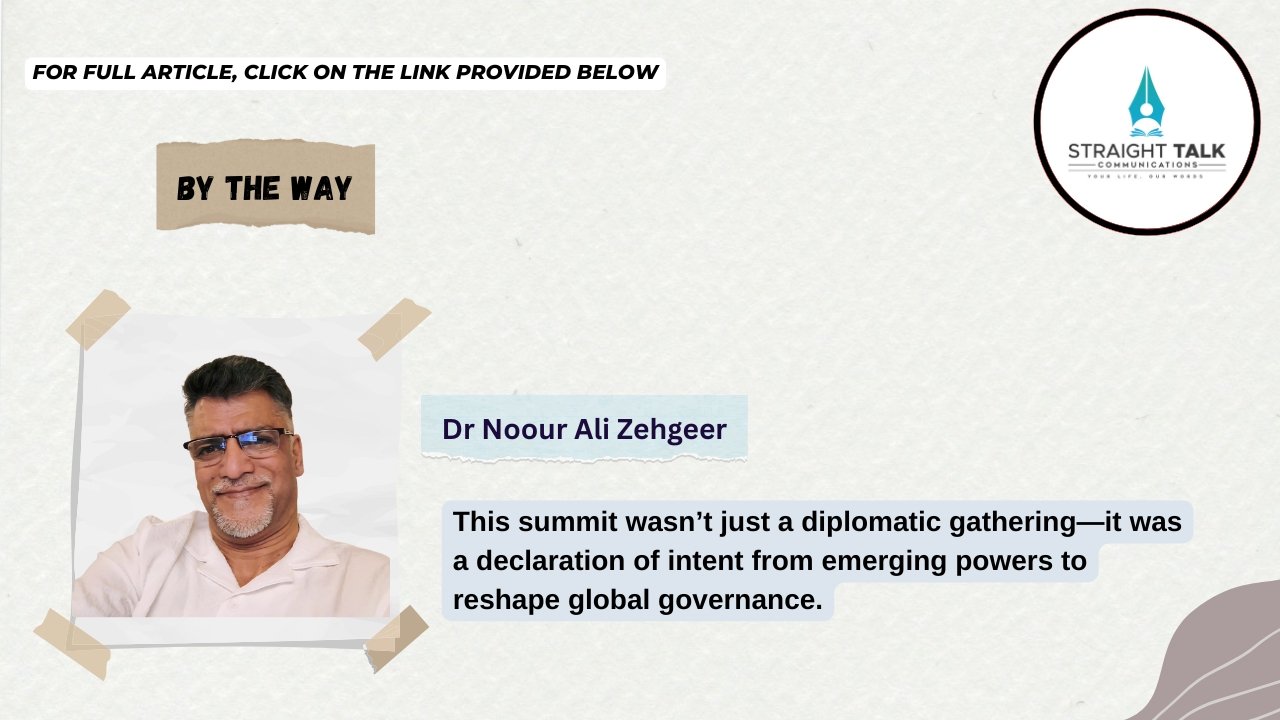India’s Strong Stand at BRICS Summit: A Voice for the Global South

This summit wasn’t just a diplomatic gathering—it was a declaration of intent from emerging powers to reshape global governance.
Dr Noour Ali Zehgeer
As the curtains close on the 17th BRICS summit in Brazil, India emerges as a key diplomatic force ahead of the G20 meet in South Africa.
The recently concluded BRICS summit in Brazil was more than just another high-level gathering—it spotlighted the pressing global concerns of our time. While the summit represented the interests of the Global South, its message was meant for the entire world. It called on nations, particularly in the West, to listen with openness and act with understanding, focusing on cooperation instead of conflict.
India played a pivotal role at the summit, advocating for global peace, security, and justice. New Delhi voiced a firm call to counter terrorism, and together with other BRICS members, condemned attacks on civilians and nuclear sites, calling for safeguards to protect humanity as a whole.
Held in Rio de Janeiro—the picturesque coastal city of Brazil—the summit signalled a shift in global power balances. It reminded the world that emerging alliances like BRICS are just as significant as traditional Western coalitions. The final declaration issued by the leaders had two key messages: a demand for fairer global governance, and a vision of how the Global South sees today’s unequal international institutions. BRICS now includes 11 full members, Brazil, Russia, India, China, South Africa, Egypt, Ethiopia, Indonesia, Iran, Saudi Arabia, and UAE. Partner countries like Vietnam, Nigeria, Kazakhstan, and others joined discussions, signalling a shift toward a broader Global South coalition.
We need to see how America responds to the out come of the summit and what new sanctions we will hear from uncle SAM. President Trumph has been taking hasty decisions, some of which could be reversed due to international outcry.
Prime Minister Narendra Modi took a bold and clear stand during the summit, emphasizing two crucial themes. First, he stated that the Global South—home to over six billion people—deserves to be heard and respected on the world stage. India, he affirmed, is the voice and vanguard of this movement.
Second, PM Modi called for a united, uncompromising campaign against terrorism. He reiterated India’s consistent policy of zero tolerance for terror in any form, and this position echoed loudly in the summit’s joint resolution.
India didn’t just speak; it led by example. It presented a vision of leadership rooted in integrity, not image—marked by conviction rather than performance. India encouraged other nations in the Global South to rise with confidence, without the burdens of colonial-era complexes or fears of neo-imperialism. In today’s world, Modi said, domination through power is unacceptable. What’s needed instead is leadership rooted in moral clarity.
During his address, PM Modi called terrorism the greatest threat to modern civilization. Referring to the April 22nd attack in Pahalgam, where 26 innocent people were killed, he described it as a brutal strike on India’s core identity and values.
However, he expanded this perspective globally, arguing that such violence affects not just one nation but all of humanity. Terrorism, he said, isn’t confined to a single region or religion—it’s a global menace with far-reaching consequences. Citing the 9/11 attacks, he warned against downplaying acts of terror based on geography or politics. Every act of terror, regardless of where it occurs, demands equal condemnation.
The summit held a mirror to international leadership, urging nations to reconsider their selective responses to global crises.
PM Modi raised an important question: “Are we truly committed to eradicating terrorism?” He stressed that there should be no compromise when it comes to taking action against terrorists. The logic was simple—victims and perpetrators of terrorism cannot be placed on the same moral footing. Action must be consistent and principled.
The BRICS joint statement reflected India’s firm stance. It unequivocally denounced all forms of terrorism, declaring such acts criminal and unjustifiable—no matter the motivation, place, or perpetrator. The leaders specifically condemned the April 22 attack in Jammu and Kashmir, reaffirming their shared pledge to fight terrorism, including its cross-border dimensions, financial networks, and safe havens.
Their message was loud and clear: there must be zero tolerance for terrorism, and no room for double standards. This summit wasn’t just a diplomatic gathering—it was a declaration of intent from emerging powers to reshape global governance.
Would you like a deeper dive into India’s positioning or the implications for global trade?
(STC)







